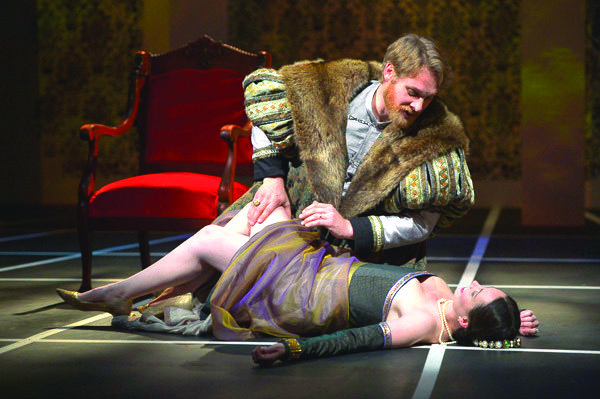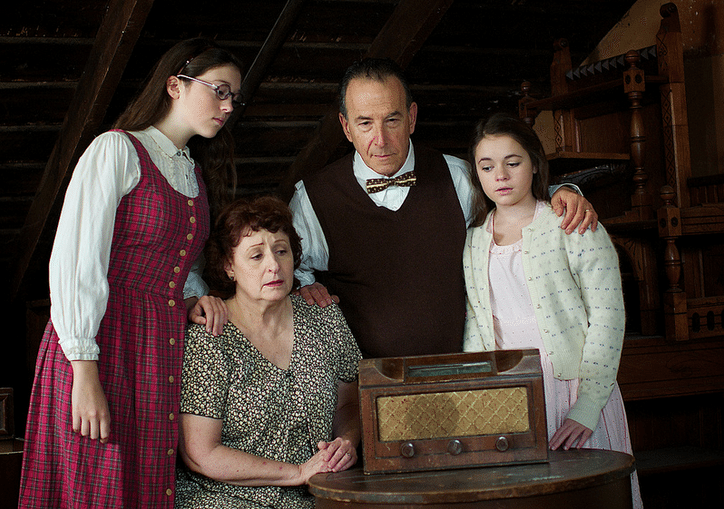By Charles Brousse
Here’s an interesting essay question for some future college entry exam. If a literary work (novel, film script, opera libretto, play) is based on a historical event or person, how important is it for the author to remain close to accepted facts? Given the number of times this is ignored, the answer is clearly, “Not very.”
Of course, there are exceptions. A Holocaust denier will be subjected to legitimate complaints. Photos and testimony bear witness. But, if the persons and events lie befogged in the distant past, purveyors of historical fiction are free to roam at will. For them, the only thing that counts is whether these creative excursions can find a receptive audience.
This brings us to Anne Boleyn, English playwright Howard Brenton’s revisionist account of King Henry VIII’s relationship with the second of six wives who enjoyed that questionable distinction. The play is currently having its first West Coast run (through May 15) at Mill Valley’s Marin Theatre Company (MTC).
Here is a condensed version of what we know for sure about Anne: A courtier during Henry’s first marriage to Catherine of Aragon, she caught the king’s eye when he grew tired of waiting for the queen to bear him a male heir. The refusal of Pope Clement VII to grant an annulment was one of the factors that led him to dissolve the English Church’s ties with Rome and declare himself ruler by Divine Right, a move that profoundly affected Britain and all of Christian Europe. Three years after Anne became queen, the continued absence of a bouncing baby boy spurred Henry to move on to another courtier, Jane Seymour. To clear the deck, Anne and four men were charged with treasonous adultery and incest (one of the men being her brother, George). Between May 17-19, 1536, all were beheaded in full public view on the Tower Green.
Brenton turns the story on its head. Anne (vigorously portrayed by Liz Sklar) becomes the revolutionary instrument instead of Craig Marker’s unexpectedly benign Henry. Anne meets with William Tyndale (Dan Hiatt), who personally delivers a copy of his translation of the New Testament from Latin to English, an achievement that strikes at the Catholic clergy’s control over religious matters. It’s Anne who pressures Henry to break with the Pope. It’s Anne who conspires with her cunning fellow reformist, Thomas Cromwell (David Ari) to bring about the downfall of powerful Cardinal Wolsey (Charles Shaw Robinson), opening the door to Britain’s version of the Protestant Reformation. Almost 70 years after her death, it’s Anne’s belongings, contained in a newly found chest, that influence King James I’s determination to solidify the unification of England and Scotland.
That, my friends, is quite a load for a lady to carry, especially when none of it is substantiated by historical research. But the relevant issue is still whether Brenton’s re-imagining results in good theater. Certainly, the greatly enlarged role assigned to his protagonist addresses the feminist complaint that history is written by men, for men, and Brenton’s revisionism is provocative. But the script, at times, feels like a tongue-in-cheek polemic, not meant to be taken seriously. Modern vulgar slang is mixed with Shakespeare-like poetic prose. Connections between Anne’s actions and their wide-ranging effects are often laughably simplistic. The brief over-the-top scenes between sybaritic James I and his giggling “playmate,” Lord Cecil, that bookend the play add to its sense of unreality.
MTC’s production, staged by artistic director Jasson Minadakis, is mostly solid. Anchored by a strong group of principals, the performance clips along at a good pace despite its length. Designer Nina Ball’s false perspective cutout version of a Gothic great room that extends partway over the audience is ingenious. Kurt Landisman’s lighting serves the action nicely. A single discordant note is struck by designer Ashley Holvick’s costumes for the court’s ladies-in-waiting, whose short skirts and heels are—like the script’s occasional spurts of present-day trash talk—at odds with the period atmosphere.
In sum, if one doesn’t mind the tinkering with the historical record, Anne Boleyn could turn out to be a stimulating evening’s companion.
NOW PLAYING: Anne Boleyn runs through May 15 at the Marin Theatre Company, 397 Miller Ave., Mill Valley; 415/388-5208; bo*******@**********re.org.









